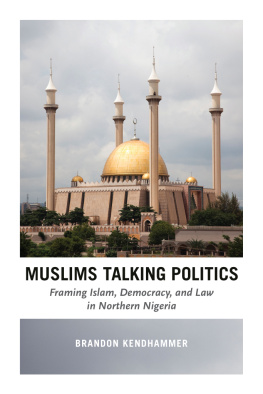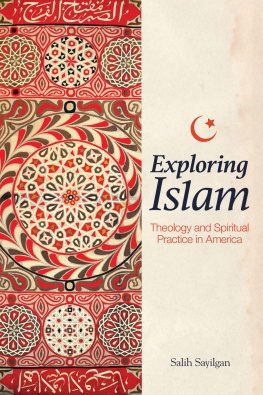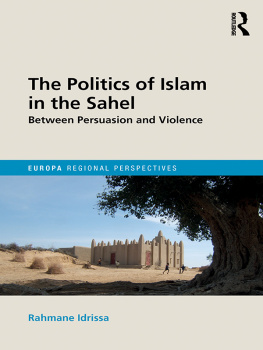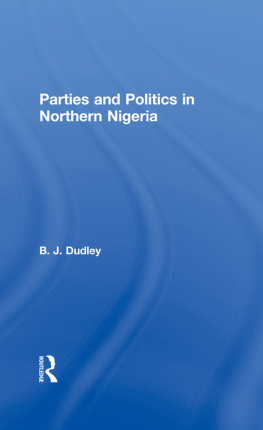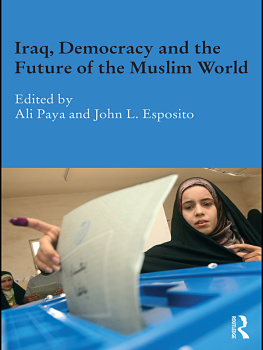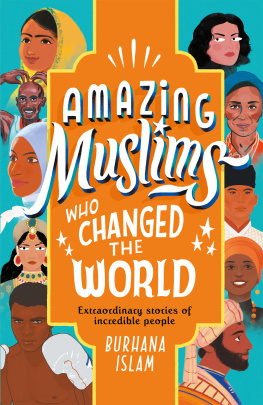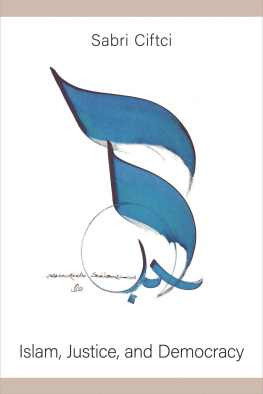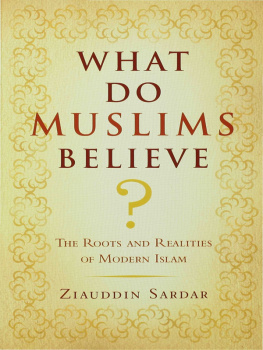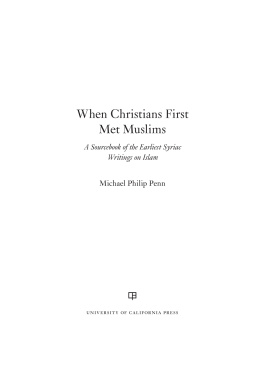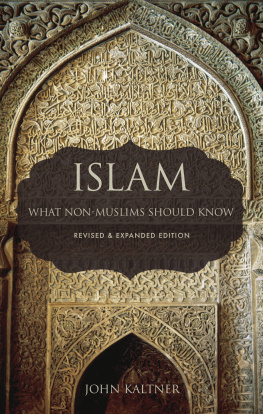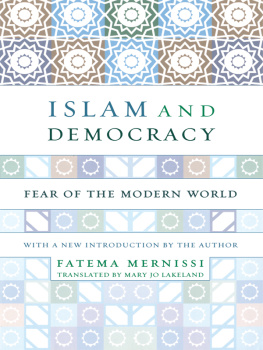Brandon Kendhammmer is assistant professor of political science and the acting director of African Studies at Ohio University.
The University of Chicago Press, Chicago 60637
The University of Chicago Press, Ltd., London
2016 by The University of Chicago
All rights reserved. Published 2016.
Printed in the United States of America
25 24 23 22 21 20 19 18 17 16 1 2 3 4 5
ISBN-13: 978-0-226-36898-6 (cloth)
ISBN-13: 978-0-226-36903-7 (paper)
ISBN-13: 978-0-226-36917-4 (e-book)
DOI: 10.7208/chicago/9780226369174.001.0001
Library of Congress Cataloging-in-Publication Data
Names: Kendhammer, Brandon, author.
Title: Muslims talking politics : framing Islam, democracy, and law in Northern Nigeria / Brandon Kendhammer.
Description: Chicago : The University of Chicago Press, 2016. | Includes bibliographical references and index.
Identifiers: LCCN 2015041740| ISBN 9780226368986 (cloth : alk. paper) | ISBN 9780226369037 (pbk. : alk. paper) | ISBN 9780226369174 (e-book)
Subjects: LCSH: DemocracyNigeria, NorthernReligious aspectsIslam. | Islam and politicsNigeria, Northern. | Islamic lawNigeria, Northern. | Islamic renewalNigeria, Northern.
Classification: LCC DT515.8 .K46 2016 | DDC 320.9669dc23 LC record available at http://lccn.loc.gov/2015041740

This paper meets the requirements of ANSI/NISO Z39.48-1992 (Permanence of Paper).
This book is about how a group of Muslims in Nigeria talks and thinks about democracy in a time of religious revivalism. It is also about that revivalism itself and how, following Nigerias return to civilian rule in 1999, popular demands for greater recognition of Islam and Islamic values in the public sphere came to center on the enactment of sharia (Islamic law) in criminal law. Its argument is threefold. First, in many Muslim-majority communities, the transition period that begins with the collapse of authoritarian rule also offers the opportunity for a broader reconsideration of the relationship between religion and state. Globally, one of the most important products of this process has been the emergence of a surprising number of popular movements for the preservation or expansion of Islamic law. Second, these demands are usually most successful when advanced not by Islamists bent on destroying the existing political order and establishing an Islamic state but by those who might reasonably be classed as moderates: members of nonreligiously affiliated political parties and ordinary citizens who express strong, generalized support for democratic government over autocracy. And third, in northern Nigeria a large proportion of Muslim political elites and ordinary citizens alike see the revival of Islamic religious values and public morality not as contrary to but as complementary to democratic institutions and practices.
What does this reconciliation look like as a matter of political reasoning? For politicians and other elites, it seems to be largely a matter of expediencyafter all, democracy and religious revivalism are often both quite popular in the wake of violent, corrupt dictatorship, and support for both might serve to rebuild citizens trust in a tainted political class. For ordinary citizens, however, the story is more complex. In their hands, democratic and religious discourses both serve as vehicles for making sense of their countrys most pressing problemscorruption, insecurity, failing social services, and stagnant growth in economic opportunityas moral failings that require a morally interventionist state to solve them. In the wake of military rules collapse in the late 1990s, both sharia and democracy came to be seen by many ordinary Nigerian Muslims as tools that might be used to force politicians and other public figures to live up to their obligations to the communities they govern.
This third argument is also the most controversial. Indeed, given the hysterics that accompany nearly all discussion of sharia in the United States and Western Europe, suggesting that the story might be a bit more complicated than all advocates of sharia are radicals and antidemocrats is a provocative statement. Of course, the popular perception that sharia and democracy can coexist doesnt necessarily make it so. For as long as Ive followed religious affairs in Nigeria, Ive found most Muslim supporters of sharia to be reasonable, thoughtful people motivated as much by the desire to improve the quality of life in their communities as by their own religious passions. To be clear, I dont share their confidence that sharia is the answer to Nigerias problems, nor would I wish to live in a society governed by many of the policies they advocate. Ive come to believe, however, that in a society as divided as Nigerias, the best hope for interreligious cooperation lies in acknowledging that its many faith communities have (at least, in some respects) fundamentally different visions of the states role in fostering public and individual morality. In a democracy, this cannot mean a return to the uncodified classical Islamic constitution or the unfettered local implementation of Islamic law. It can and should mean, however, that Muslims be free (or at least, as free as Christians and members of other religious communities) to pursue a measure of state recognition and support for their values in public policy, particularly when their broader goalsaccountability, good governance, and developmentmight strengthen democratic institutions and practices over the long run.
An optimism that such a balance could be struckand that it was slowly emerging in Nigeriawas one of the most important things I brought back from my initial year of research for this book in 20078. But in late July 2009, a series of disturbing rumors began to trickle out of the formerly sleepy city of Maiduguri in Borno State. A small community of religious revivalists loosely connected to another group that had gained local notoriety a half-decade earlier as the Nigerian Taliban had engaged in a series of clashes with local police and security officials, culminating in a massive outburst of violence that spanned three states and left perhaps a thousand dead. In both scale and gruesomenessits most enduring image is Boko Harams leader, Mohammed Yusuf, naked from the waist up and flanked by security agents minutes before his illegal executionthis conflagration harkened back to other similar events in recent Nigerian history, all of which had begun with a small community of radicals rejecting the states authority and ended with brutal crackdowns. In the months following, uncertaintyabout the groups origins, its ideology, and its status following Yusufs assassinationproliferated, often at the expense of sound analysis of what had actually happened. But with few exceptions, nearly everyone I spoke with about it expressed the opinion that, just as it always had, the Nigerian governments violent efforts would eventually succeed at eliminating the threat. In this, we were wrong.
For all the immediacy of its violence, the long-term legacy of Boko Haram in Nigerian political and religious life remains uncertain. Some Nigerian Christians at home and in the diaspora have framed the conflict as a war against them, thereby earning the support of global conservative activists. Others have read into it a vast range of conspiracy theories, identifying at one time or another nearly all members of the countrys political establishment as shadowy sponsors of its activities. Still others have suggested, quite rightly in my estimation, that the conflict has imposed a huge cost on Muslim and Christian Nigerians alike and that it must be understood as a war on
 This paper meets the requirements of ANSI/NISO Z39.48-1992 (Permanence of Paper).
This paper meets the requirements of ANSI/NISO Z39.48-1992 (Permanence of Paper).
